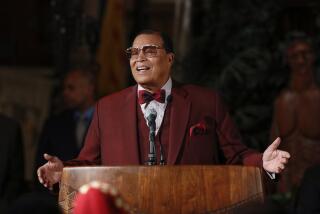Is It Mirror-Image We Fear in Farrakhan?
It is easy, perhaps too easy, to jump onto the bandwagon and condemn Louis Farrakhan. It is much more instructive to search for the significance of Louis Farrakhan and his message.
The support for Farrakhan conveys an important lesson about race relations in America. His support is a reminder of the unique life circumstances confronting black America that give rise to a leader like Louis Farrakhan.
Equally important is an examination of the opposition to Farrakhan and what that opposition represents. In some respects the vehemence of the opposition to Farrakhan is what gives him power and significance.
Farrakhan has a large following. He appeals precisely to those who have been historically denied equal opportunities in America. To the millions who make up the black underclass, Farrakhan offers vicarious power. He unabashedly confronts the system--a system that has not treated the black poor well. In his confrontational rhetoric, Farrakhan offers revenge for those who have been victimized by centuries of racial oppression. Like others, he uses the device of out-group antagonism in order to breed in-group cohesiveness.
Farrakhan also offers hope. After all, his major premise is not to derogate Judaism or Israel or whites (although these things do, unfortunately, invade his rhetoric), but to offer blacks alternatives for economic survival and independence. For the hopelessly despairing, Farrakhan’s message of economic viability, and self- and group pride, is a breath of fresh air.
Farrakhan’s self-help programs, ironically, capture the spirit of the current Administration’s emphasis on modifications to America’s welfare system. Farrakhan’s message embraces a bootstraps metaphor: Poor blacks must extricate themselves from their current economic malaise.
What is most significant, however, is not Farrakhan, but the responses that he generates. Racial hatred certainly is not new to America. Indeed, evidence of a resurgence of white supremacy is recurrent throughout the United States. Yet nowhere is opposition to white supremacy as visible as the opposition to Farrakhan--who, incidentally, says nothing about the inherent superiority or inferiority of the races.
The vehemence of the rejection of Farrakhan is therefore curious. With his calculated outlandishness, he poignantly raises issues that need to be raised: the pervasiveness of racism, the plight of poor blacks, and Israel’s relationship with South Africa.
Racism is alive and well in America. Indeed, the belief in white supremacy and black inferiority is given the stamp of “scientific objectivity” when it emanates from scholars in American universities. Distinguished professors at the University of California and elsewhere are making their careers in an effort to demonstrate the biological superiority of whites and the genetic inferiority of blacks and other minorities. Attacking Farrakhan for his “divisiveness” rings hollow within a social-cultural context that is marked by racial separation in housing and schools.
Perhaps the rejection of Farrakhan is an instance of mirror-image racism: He is rejected because he reflects a narrow ideology not unlike white racism. Is the rejection of Farrakhan a symbolic effort to reject racism within ourselves? Or is the negative attention on Farrakhan a means of avoiding the realities of white racism?
Farrakhan grimly reminds us of the need to redress the relationship between blacks and Jews. Their historical alliance is threatened by both Farrakhan and Israel’s past support of South Africa. Farrakhan’s comments about Judaism are indefensible, and require correction. Israel’s relationship with South Africa deserves closer scrutiny--not by Farrakhan, but by American Jews.
Farrakhan, therefore, offers a number of lessons. He reminds us that much remains to be done in the arena of race relations. He stimulates, or should stimulate, a close examination of the sociopolitical reality that has bred Farrakhan and others like him.
He reminds us of the importance of the constitutional guarantees of freedom of speech. Those guarantees were not for those who say things that we agree with, but precisely for those who challenge “conventional wisdom.” It is through open debate and confrontation that we can achieve the needed synthesis of differing viewpoints. The architects of the Bill of Rights included the freedom of speech, irrespective of whether we like what some people might say or whether what they say is clearly wrong. It is sad to see political figures scurry to squelch freedom of speech and freedom of assembly. Instead, we should take advantage of the opportunity to respond to those with whom we disagree. In this, Farrakhan does us a favor. He presents controversial ideas for all to see, debate and learn from.
More to Read
Sign up for Essential California
The most important California stories and recommendations in your inbox every morning.
You may occasionally receive promotional content from the Los Angeles Times.










